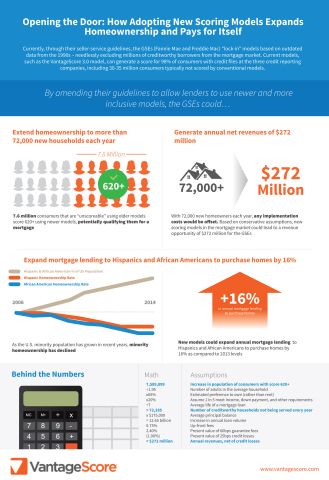A new credit model could potentially add another $272 million in annual revenues for Fannie Mae and Freddie Mac and also increase the amount of mortgages made to Hispanic and African-American households.
A new credit model could potentially add another $272 million in annual revenues for Fannie Mae and Freddie Mac and also increase the amount of mortgages made to Hispanic and African-American households.
VantageScore Solutions has released the results of a study assessing the social and financial impact of revised credit score requirements at Fannie Mae and Freddie Mac.
Currently, through their seller-service guidelines, Fannie Mae and Freddie Mac lock-in models based on sample dates from the 1995 - 2000, which ultimately exclude millions of creditworthy borrowers, according to VantageScore. Its impact assessment estimates that 72,285 creditworthy households would additionally be served annually by more inclusive scoring models if these guidelines were amended. The estimate includes expanding mortgage access to 16% more Hispanic and African American households as compared with 2013 levels.
The VantageScore 3.0 model is able to generate a score for 98% of those consumers with credit files at the three credit reporting companies, including 30-35 million consumers typically not scored by conventional models. Among those within this population, 7.6 million have credit scores of 620 or above, potentially qualifying them for a mortgage, according to VantageScore.
 “The business case for allowing lenders to use updated and more inclusive credit scoring models is perhaps only matched by the impact on the many creditworthy households that are currently all but invisible to mortgage lenders,” Mike Trapanese, senior vice president of VantageScore Solutions, said. “As the demographic make-up of homebuyers evolves it’s critical that the current system effectively provides access to sustainable homeownership for all creditworthy borrowers. These findings demonstrate that there is upside for the GSEs and the time to invest in the future is now.”
“The business case for allowing lenders to use updated and more inclusive credit scoring models is perhaps only matched by the impact on the many creditworthy households that are currently all but invisible to mortgage lenders,” Mike Trapanese, senior vice president of VantageScore Solutions, said. “As the demographic make-up of homebuyers evolves it’s critical that the current system effectively provides access to sustainable homeownership for all creditworthy borrowers. These findings demonstrate that there is upside for the GSEs and the time to invest in the future is now.”
As part of its 2015 scorecard, the Federal Housing Finance Agency (FHFA), which regulates Fannie Mae and Freddie Mac, has directed the government-sponsored enterprises (GSEs) to “Assess the feasibility of alternate credit score models and credit history in loan-decision models, including the operational and system implications.”
“Homeownership opportunities for creditworthy borrowers should not be constrained or limited by legacy scoring systems and models,” Jim Carr, housing finance, banking and urban policy expert, said. “The net benefits of the GSEs and FHFA allowing lenders to use more inclusive credit assessment tools include not only expanding homeownership in a safe and sound manner but also creating a more robust and sustainable housing recovery and stronger economy for America.”



